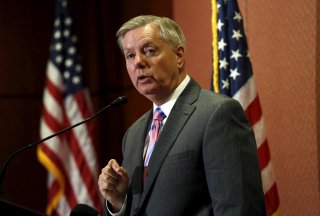Supreme Court: Graham Must Testify in Georgia Election Probe
Graham has been fighting the order to testify for months, but the Supreme Court’s decision marks another milestone in Fulton County’s ongoing investigation into 2020 election interference.
The Supreme Court on Tuesday rejected Sen. Lindsey Graham’s (R-SC) petition to block a subpoena seeking his testimony as part of a wide-ranging investigation into 2020 election interference in Georgia, Axios reported.
Justice Clarence Thomas, who briefly blocked the subpoena last week, referred the matter to the full court before the ruling.
“The lower courts assumed that the informal investigative fact-finding that Senator Graham assertedly engaged in constitutes legislative activity protected by the Speech or Debate Clause [...] and they held that Senator Graham may not be questioned about such activities,” the Supreme Court’s unsigned order states.
“The lower courts also made clear that Senator Graham may return to the District Court should disputes arise regarding the application of the Speech or Debate Clause immunity to specific questions,” it continued.
“Accordingly, a stay or injunction is not necessary to safeguard the Senator's Speech or Debate Clause immunity.”
Fulton County district attorney Fani Willis opened the high-profile investigation early last year after a January 2, 2021, phone call between former President Donald Trump and Georgia secretary of state Brad Raffensperger. During that conversation, Trump asked Raffensperger to “find” the votes needed to overturn his narrow loss in the state.
Willis and her team have stated that they want to ask Graham about two specific phone calls they say he made to Raffensperger and his staff shortly after the election. During those calls, Graham asked about “reexamining certain absentee ballots cast in Georgia in order to explore the possibility of a more favorable outcome for former President Donald Trump,” according to Willis.
Graham, who has been fighting the subpoena since it was issued this past summer, has repeatedly asserted that he shouldn’t have to answer questions about the calls because they had a legislative purpose and therefore were covered by the speech and debate clause of the constitution. Graham told the justices in court filings that his calls with Georgia officials were related to the “impending vote on certifying the election,” and because, as chairman of the Senate Judiciary Committee at the time, he was tasked with “reviewing election-related issues.”
“The district court’s and District Attorney’s apparent suspicions about motives are baseless, but even assuming otherwise, the Speech or Debate Clause was designed to prevent exactly this sort of examination,” Graham wrote.
He added that a lower court was “wrong, also, to think that any other lines of hypothetical questioning would be permissible.”
Ethen Kim Lieser is a Washington state-based Finance and Tech Editor who has held posts at Google, The Korea Herald, Lincoln Journal Star, AsianWeek, and Arirang TV. Follow or contact him on LinkedIn.
Image: Reuters

